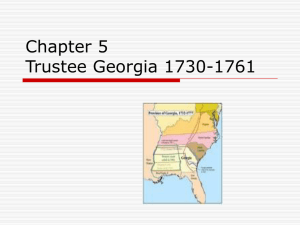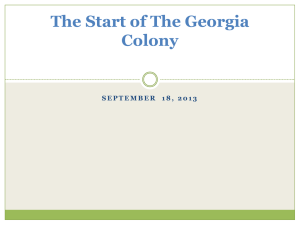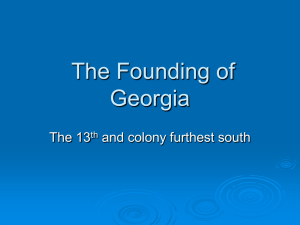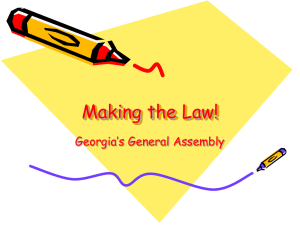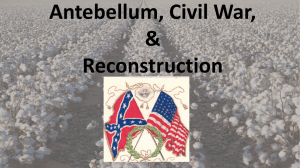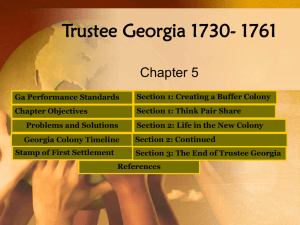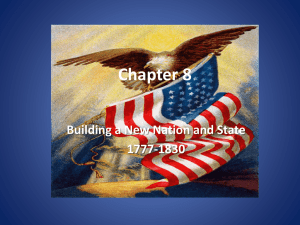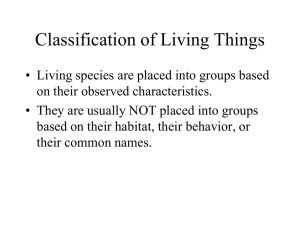File - Autrey Mill Middle School Georgia Studies
advertisement
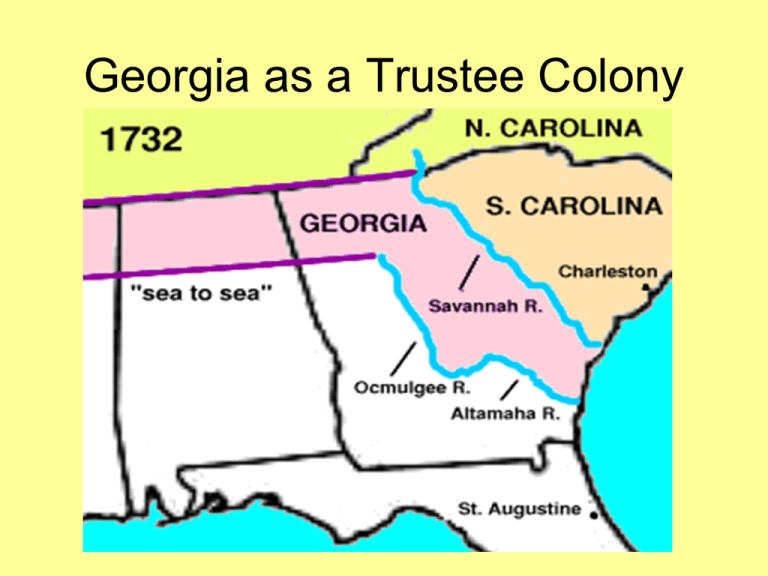
Georgia as a Trustee Colony Why did King George II allow Georgia to become the 13th colony? CHARITY ECONOMICS DEFENSE REASONS FOR COLONIZING GEORGIA CHARTER OF 1732 • WHO: King George II, James Oglethorpe, 20 trustees, total of 115 colonists • WHAT: Document to start a colony in Georgia • WHEN: 1732 • WHERE: All land between Altamaha and Savannah Rivers to the south seas • WHY: 1) Defense: protection from Spanish, French, and Native Americans, 2) Economics: provide resources for Britain, 3) Charity: populate the colony with “worthy poor” THE TRUSTEES Twenty one men (including James Oglethorpe) were the founders of the Georgia colony. They negotiated treaties with the Native Americans, made regulations (guidelines or rules) about what the colonists could and could not do. They were entrusted by King George II to manage the colony of Georgia. Spanish claims What role did James Oglethorpe, Tomochichi, and Mary Musgrove play in the colonization of Georgia? Tomochichi Chief of the Yamacraw Indians. Became friends with Oglethorpe and allowed colonists to settle on Yamacraw Bluff near Savannah River in order to trade with the English. Traveled to England and convinced his own people the English had good intentions of colonizing the land in Georgia. Mary Musgrove Daughter of an English trader and a Creek Indian mother. She served as a translator for Tomochichi and Oglethorpe and helped the peaceful relationship between the Indians and colonists by operating a trading post in Savannah. James Oglethorpe Englishman who founded the colony of Georgia and built the city of Savannah. Served in British military and Parliament and convinced King George II to grant him a charter to colonize Georgia with English citizens who were in debt. As time passed, Oglethorpe found that more and more colonists were struggling with health problems. What do you think were some of the reasons for this issue? • Reasons for health issues: • -Lack of fresh veggies...Why? • -Change in climate...Why? • -Poor sanitation...Why? • -Hard physical labor...Why? New Colonists Arrive • July 1733: a ship carrying 42 Jews anchored in Savannah and asked to settle in Savannah with the British; Oglethorpe agrees • Dr. Samuel Nunis was aboard this ship, and Oglethorpe immediately made him the new doctor of Savannah • Nunis saved the lives of many colonists, and is credited with saving the colony through his work ROLE OF THE SALZBURGERS AND HIGHLAND SCOTS Copy this down and answer questions as we go forward. • WHO: SALZBURGERS • WHAT: • WHO: HIGHLAND SCOTS • WHAT: • WHEN: • WHERE: • WHEN: • WHERE: • WHY: • WHY: TRUSTEE PERIOD • TRUSTEE PERIOD LASTED FROM 1732 – 1752 • KING GEORGE II ALLOWED THE TRUSTEES TO GOVERN THE COLONY • TRUSTEES WERE A GROUP OF MEN WHO GOVERNED THE COLONY OF GEORGIA, LED BY JAMES OGLETHORPE • NEW COLONISTS ARRIVED TO GEORGIA: SALZBURGERS AND HIGHLAND SCOTS – BROUGHT WITH THEM THEIR CULTURE • RELIGIOUS FREEDOM IN GEORGIA ATTRACTED EUROPEAN PROTESTANTS – EVENTUALLY THE METHODISTS CHURCH WAS FOUNDED IN GEORGIA SALZBURGERS • “The Georgia Salzburgers, a group of Germanspeaking Protestant colonists, founded the town of Ebenezer in what is now Effingham County. Arriving in 1734, the group received support from King George II of England and the Georgia Trustees after being expelled from its home in the Catholic principality of Salzburg (in presentday Austria). The Salzburgers survived extreme hardships in both Europe and Georgia to establish a prosperous and culturally unique community.” - New Georgia Encyclopedia video SALZBURGERS key points • 1734 - came to Georgia after being expelled from Germany / Austria for not being Catholic • Protestants who wanted religious freedom • Created the town of Ebenezer, but was too swampy to survive • Relocated to the town of New Ebenezer along Savannah River – became a very religious community, also had silk mills • Trustees liked the hard working Salzburgers because they did not like slavery or alcohol which were rules the colonists had to live by Rincon, Georgia is where the town of New Ebenezer was located. ROLE OF THE SALZBURGERS AND HIGHLAND SCOTS • WHO: SALZBURGERS • WHAT: GROUP OF PROTESTANT PEOPLE FROM EUROPE WHO HELPED COLONIZE GEORGIA • WHEN: 1734 • WHERE: BUILT THE TOWN OF NEW EBENEZER NORTHWEST OF SAVANNAH ALONG THE SAVANNAH RIVER. • WHY: ESCAPED RELIGIOUS PERSECUTION FROM CATHOLIC CONTROLLED GERMANY / AUSTRIA • WHO: HIGHLAND SCOTS • WHAT: • WHEN: • WHERE: • WHY: HIGHLAND SCOTS • “James Oglethorpe wanted to protect the Georgia colony from possible attacks from Spanish Florida. The men of Scotland had the reputation of being good soldiers, and so Oglethorpe recruited a group of about 175 Highland Scots to settle in the area south of Savannah. The group arrived at the Altamaha River in 1736 and established a settlement they originally called New Inverness. Later, they changed the name to Darien.” - Dr. Glen Blankenship and Vicki Wood Video HIGHLAND SCOTS key points • Came to Georgia in 1736 from Scotland • Built the town / fort of Darien south of Savannah along the Altamaha River • Reputation of hard working people who were good soldiers • Protected the Georgia colony from Spanish Florida – helped Oglethorpe push the Spanish out of Georgia in the Battle of Bloody Marsh • Changed from farming to cattle raising and harvesting timber • Opposed slavery in the colony Darien: Where the Highland Scots built a fort and settlement to protect the colony from Spanish Florida ROLE OF THE SALZBURGERS AND HIGHLAND SCOTS • WHO: SALZBURGERS • WHAT: GROUP OF PROTESTANT PEOPLE FROM EUROPE WHO HELPED COLONIZE GEORGIA • WHEN: 1734 • WHO: HIGHLAND SCOTS • WHAT: GROUP OF SOLDIERS FROM SCOTLAND WHO HELP COLONIZE GEORGIA AND DEFEND THE COLONY FROM THE SPANISH • WHEN: 1736 • WHERE: BUILT THE TOWN OF NEW EBENEZER NORTHWEST OF SAVANNAH ALONG THE SAVANNAH RIVER. • WHERE: BUILT THE TOWN CALLED DARIEN ALONG THE ALTAMAHA RIVER • WHY: ESCAPED RELIGIOUS PERSECUTION FROM CATHOLIC CONTROLLED GERMANY / AUSTRIA • WHY: OGLETHORPE NEEDED THEIR MILITARY HELP TO DEFEAT THE SPANISH DURING THE BATTLE OF BLOODY MARSH MALCONTENTS “Whereas many of Georgia's original settlers came with monetary aid from the Trustees, most of the Malcontents arrived without assistance and thus did not have the same loyalty to the colony's founders. In particular, the Malcontents objected to the Trustees' limits on land ownership and prohibitions on slavery and rum. Since the Malcontents could afford to purchase slaves and vast tracts of land, they felt the policies of the Trustees prevented them from realizing their economic potential.” - New Georgia Encyclopedia COMPARING TWO COLONIES GEORGIA • TRUSTEE COLONY • NO SLAVERY • NO RUM • LAND LIMITS 500 acres • FEMALE COULD NOT INHERIT LAND • FORCED TO GROW MULBERRY TREES, GRAPES, AND INDIGO PLANTS • STRUGGLED TO MAKE MONEY SOUTH CAROLINA • ROYAL COLONY • SLAVERY WAS ALLOWED • TRADE RUM WITH INDIANS • NO LAND LIMITS • FEMALES COULD INHERIT LAND • COULD GROW COTTON, RICE, AND TOBACCO • VERY PROFITABLE BATTLE OF BLOODY MARSH “On July 7, 1742, English and Spanish forces skirmished on St. Simons Island in an encounter later known as the Battle of Bloody Marsh. This event was the only Spanish attempt to invade Georgia during the War of Jenkins’s Ear, and it resulted in a significant English victory. General James Oglethorpe redeemed his reputation from his defeat at St. Augustine, Florida, two years earlier, and the positive psychological effects upon his troops, settlers, other colonists, and the English populace rallied them to the cause to preserve Georgia.” - New Georgia Encyclopedia The Beginning of the End? Despite things looking up for James Oglethorpe, he was recalled to England to defend himself against charges of not capturing St. Augustine. He is cleared of the charges but never returned to Georgia. Without Oglethorpe, the colony undergoes a series of changes, including legalizing slavery and allowing the colonists to own more land. In 1752, as Georgia grew, Parliament chose to stop funding the colony one year before the end of the original agreement in the charter. Great changes lie ahead for Georgia. What do you think might happen?

